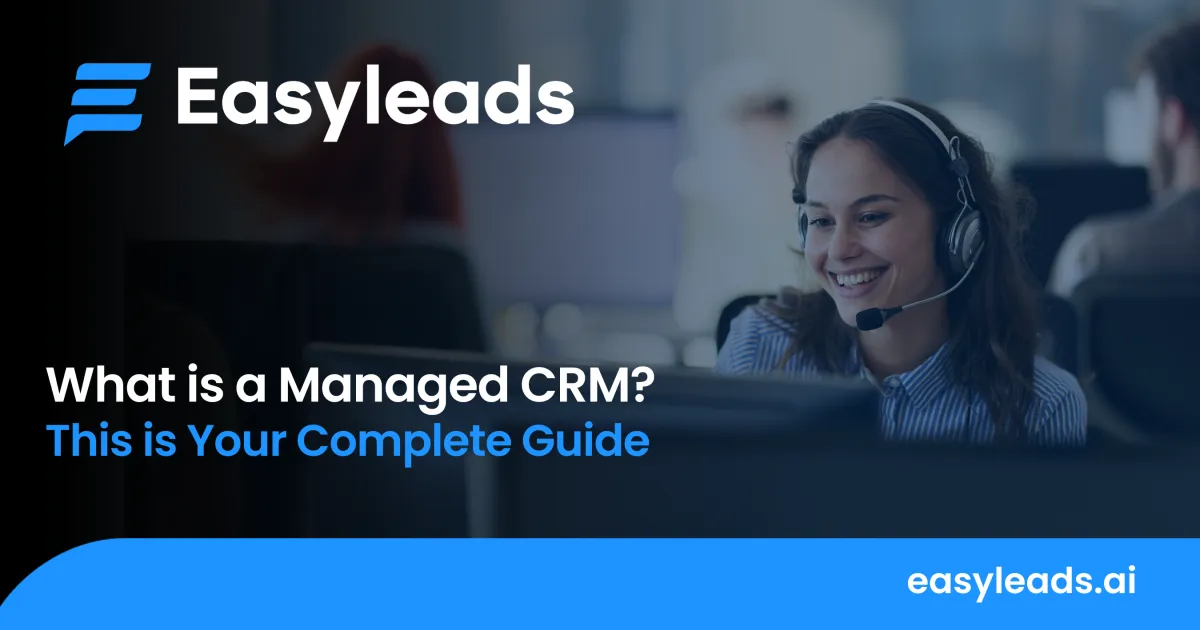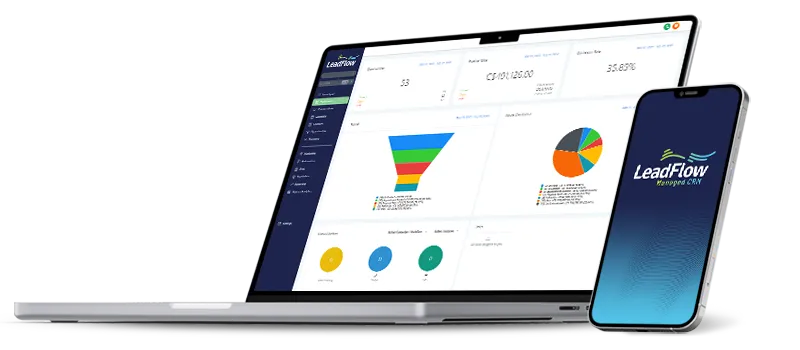Blog

What is a Managed CRM? This is Your Complete Guide
Customer Relationship Management (CRM) systems have become essential tools for businesses looking to organize their sales processes and maintain customer relationships. However, many business owners discover that implementing and maintaining a CRM system takes a lot more mental power, time and money than initially anticipated. This reality has led to the emergence of managed CRM solutions, a comprehensive approach that addresses the common challenges you face with implementing a CRM the old-fashioned way — by yourself.
Understanding Managed CRM Solutions
A managed CRM is a complete service model where you receive not just the software platform but also ongoing support, setup assistance, training, and maintenance. Unlike traditional CRM systems that require you to handle implementation, customization, and troubleshooting independently, managed CRM providers take responsibility for ensuring the system works effectively for your business.
Most businesses lack the technical expertise or dedicated resources to properly implement and maintain complex CRM systems. Managed CRM providers bridge this gap by offering support that extends far beyond basic software access, giving you the tools you need without the headaches.
The Hidden Costs of Traditional CRM Systems
As a business owner, you’ve probably experienced sticker shock when you discover the true cost of CRM ownership extends well beyond monthly subscription fees. Traditional CRM systems frequently include unexpected expenses that can significantly impact your budget.
Per-user charges can escalate quickly as your team grows, while feature limitations often force you to purchase expensive add-ons for basic functionality. Integration costs mount when you need to connect your CRM with existing tools and systems. Additionally, many CRM providers offer minimal support, leaving you to figure out everything on your own.
Training costs are another significant expense, as your team might need extensive instructions on how to use CRM systems effectively. The time investment for setup and customization can consume weeks or months of your valuable business resources.
These hidden costs often double or triple what you initially thought you were going to spend.
Common CRM Implementation Challenges
With how complex CRMs are now, they create numerous obstacles when you attempt to implement them yourself. Many business owners find themselves overwhelmed by all the configuration options and technical requirements involved in setting up an effective CRM.
Team adoption presents another major hurdle. Your employees might not want to learn a new system, particularly when those systems are difficult to navigate or lack intuitive design. Without proper training and ongoing support, CRM implementations frequently fail.
Your business probably also uses multiple software tools for different parts of your operations, and connecting these systems with a new CRM often requires technical expertise that you don't have internally.
The Managed CRM Advantage
Managed CRM solutions address these challenges by providing comprehensive support throughout your entire CRM lifecycle. This approach begins with a consultation to understand your business needs and goals, followed by a customized setup that aligns with your specific workflows and processes.
Professional onboarding ensures your team receives proper training and support during the transition period. Ongoing technical support means you have access to expert assistance whenever questions or issues arise. This eliminates the frustration and downtime associated with trying to resolve CRM problems on your own.
Managed CRM providers also handle system updates, maintenance, and security, ensuring you always have access to the latest features and protection.
Key Features of Effective Managed CRM Services
Managed CRM services encompass multiple components that allow you to get the most out of your system and increase the likelihood of your team actually using it. A personal consultation helps identify your specific requirements and customizes the system accordingly.
Setup assistance includes data migration, workflow configuration, and integration with your existing business tools. Training programs ensure all your team members understand how to use the system effectively, while ongoing support means you’ll have continuous assistance as your needs evolve.
Regular system monitoring and maintenance keep your CRM running smoothly, and security updates and backup services protect your valuable customer data. These services work together to create a complete solution that removes the burden of CRM management from your shoulders.
Measuring the ROI of Your Managed CRM
The value of a managed CRM extends beyond avoiding hidden costs and implementation challenges. You typically see improved lead capture rates, better lead nurturing processes, and higher conversion rates.
Time savings are a significant benefit for your business, as your team can focus on selling and serving customers rather than troubleshooting technical issues. Improved data organization leads to better decision-making and more effective sales strategies.
The cost of poor lead management, including lost opportunities and inefficient processes, often exceeds your investment in managed CRM services. It’s been proven that businesses lose thousands in missed opportunities annually due to inadequate lead capture, nurturing, and conversion processes.
Choosing the Right Managed CRM Provider
Selecting the right managed CRM provider means you have to keep several factors in mind that matter to your business. The level of support offered should align with your business needs and technical capabilities. Transparent pricing helps you avoid unexpected costs and budget overruns.
Integration capabilities ensure the CRM can work effectively with your existing business tools and processes. Scalability allows the system to grow with your business without requiring complete reimplementation as you expand.
Their glowing reputation and track record will mean that you’ll successfully implement your new system and have ongoing support if you work with them. References from similar businesses can provide valuable insights into the provider's effectiveness and service quality, helping you make the right choice.
The Future of CRM Management
The trend toward managed CRM services reflects the growing recognition that technology alone doesn't solve your business challenges. Successful CRM implementation requires expertise, ongoing support, and continuous optimization based on real-world usage.
As CRM systems become more sophisticated, the value of managed services increases as well for your business. You benefit from accessing advanced features and capabilities without needing to develop internal expertise in complex software systems.
Managed CRM represents a strategic approach that allows you to focus on what you do best – running your business – while ensuring you have access to effective tools and support for managing your customer relationships and sales processes.
Want to explore what a managed CRM can do to help lighten your workload? Let’s book a quick discovery call, and we’ll walk you through Easyleads with a simple, clear demo. You’ll see how handing off your CRM management makes all the difference for your business.

Copyright Easyleads CRM 2023 - Privacy Policy - All Rights Reserved

